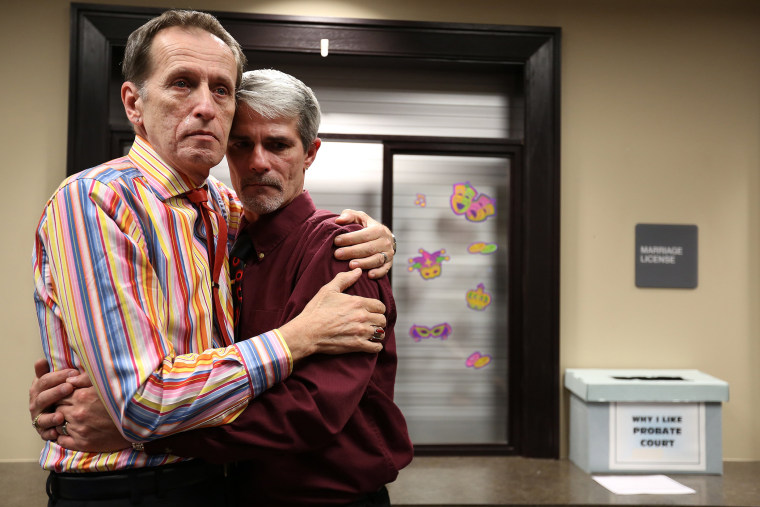The situation for same-sex couples hoping to marry in the state of Alabama may get worse before it gets better -- but get better it will, legal experts say.
Probate judges in the Deep South state appeared to have stopped issuing marriage licenses to same-sex couples as of Wednesday, and at least one probate judge in Alabama’s second-most populous county -- Mobile -- stopped issuing marriage licenses altogether. The action follows a late Tuesday order from the state Supreme Court instructing all probate judges to no longer grant same-sex couples marriage licenses.
WATCH: A real setback for marriage in Alabama
Tuesday’s order directly contradicted a federal ruling striking down the state’s same-sex marriage ban earlier this year, a decision which the U.S. Supreme Court allowed to go into effect last month. Certain state officials -- in particular, Alabama Supreme Court Chief Justice Roy Moore -- have been resisting that federal ruling ever since. "We regret having to take this action, but feel that it is necessary given the unprecedented circumstances that currently exist," read a message posted Wednesday on the Mobile County Probate Court’s website announcing that it had shut down its marriage licensing division.
“Unprecedented” is right, gay rights advocates say. Even in some of the reddest parts of the country -- such as Kansas, Utah, and South Carolina -- federal orders in favor of same-sex marriage have never seen this level of defiance.
“[Alabama] is unique in terms of its open hostility toward the civil rights of lesbian and gay people, and in terms of its open contempt for the federal government,” Shannon Minter, legal director of the National Center for Lesbian Rights (NCLR,) told msnbc. “No other state has displayed those characteristics.”
In January, U.S. District Judge Callie V.S. Granade, a President George W. Bush appointee, struck down Alabama’s ban on same-sex nuptials, staying the effects of her ruling until Feb. 9. Both the 11th Circuit of Court of Appeals, and the U.S. Supreme Court then proceeded to deny the state’s requests for a longer stay, clearing the way for Alabama to become the 37th state with legalized marriage equality.
RELATED: Alabama Supreme Court orders judges to stop gay marriages
But the situation was thrust into legal chaos when Chief Justice Moore ordered probate judges to continue acting in accordance with Alabama’s ban. Because no probate judge was listed as a defendant in the suit that led to Granade’s ruling, he argued, that decision could not compel those judges to grant same-sex couples marriage licenses.
To clear up the confusion, Granade held another hearing in February and issued another order specifically requiring Mobile County’s probate judge to begin licensing marriages between same-sex couples. Forty-eight of Alabama’s 67 counties followed suit, according to Human Rights Campaign (HRC.)
But after weeks of marriage equality in the state, Alabama’s Supreme Court threw the matter into legal limbo once more. In a 134-page decision issued Tuesday, the state’s Republican-dominated high court said that Alabama probate judges had a “ministerial duty” not to issue marriage licenses contrary to the state’s ban. “Nothing in the United States Constitution alters or overrides this duty,” the ruling said.
Yet again, probate judges found themselves in a tight spot. “It set up a pretty direct clash between Granade’s ruling and this one,” Carl Tobias, University of Richmond law professor, told msnbc. “Around the country where there’ve been conflicts of that sort, state judges have deferred to federal judges on this issue. We haven’t seen anything exactly like this.”
RELATED: Nebraska's same-sex marriage ban goes down
Neither the American Civil Liberties Union of Alabama, nor HRC Alabama were able to find any probate judges still issuing marriage licenses to same-sex couples on Wednesday. In the state’s biggest counties -- like Jefferson and Montgomery -- marriage equality had come to a complete halt.
“As a named party in continuing litigation on this matter, I am bound by this order from the state's highest court, whether I agree with it or not,” said Montgomery County Probate Judge Steven Reed, one of the state’s first probate judges to begin issuing marriage licenses to same-sex couples, in a statement. “As one who has the utmost respect for the rule of law, the Montgomery County Probate Court will continue to issue marriage licenses and perform marriage ceremonies. However, we will no longer issue marriage licenses to same sex couples until provided legal clearance to do so by the Alabama Supreme Court or additional action by the Federal court."
The Alabama Supreme Court gave probate judges five days to respond to the order if they believed it shouldn’t apply to them. In the meantime, LGBT groups say they'll examine a number of different options to try and restore marriage equality to the state. “Additional litigation almost certainly will be required,” said Minter. “It’s so frustrating that anything like that should even be required. It’s just not necessary.”
Probate judges who disagree with the state Supreme Court order could appeal to the U.S. Supreme Court, Tobias said. Or they could wait for the high court justices to issue their decision on whether same-sex couples have a constitutional right to wed. The justices will hear arguments in marriage equality cases out of four states next month, and could issue a landmark ruling for gay rights come June.
If the nation’s highest court ends up declaring same-sex marriage bans unconstitutional -- as it is expected to do -- legal experts don’t see Alabama or any other state resisting. “This is just a bump in the road to marriage equality,” Susan Watson, executive director of the ACLU of Alabama, told msnbc. “It’s going to happen. I just think this is a stunt by Chief Justice Moore and the state Supreme Court to resist what’s inevitably going to happen here.”
